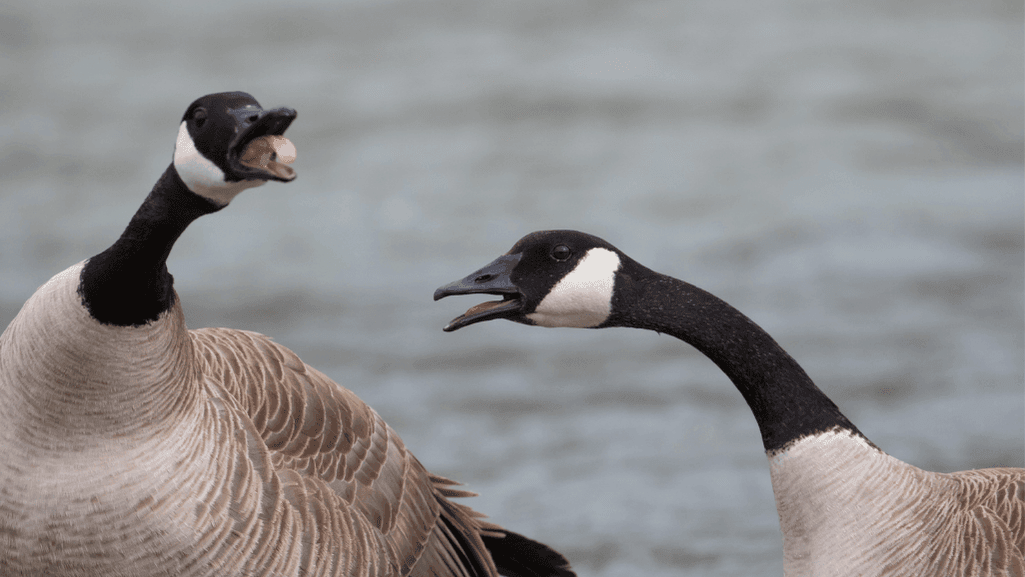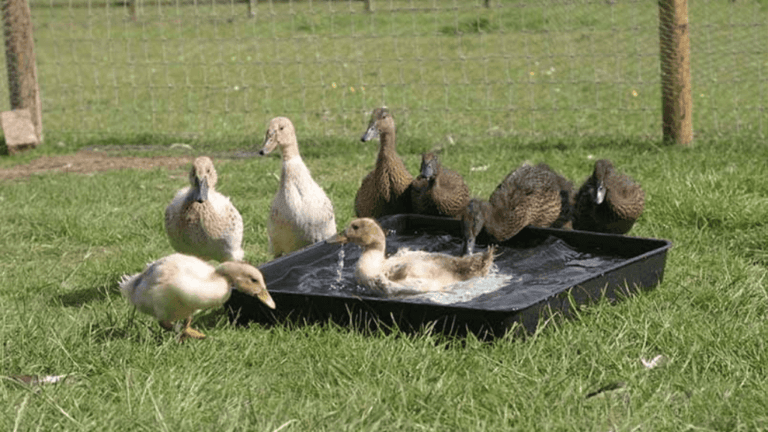The sound of geese honking is full of meaning that we often miss. The geese honking meaning tells us a lot about their social lives. It shows their behaviors and what they want to say. By decoding geese honking, we can learn more about these amazing birds that live around us.
When geese migrate, their honks are like a call to action. They help the flock stay together. Knowing what geese honking means can also help us avoid conflicts with them. Companies like Goose Masters help manage geese problems.
Watching geese fly in V formation is amazing. It shows how important their honks are for flying well together. For centuries, their honks have been a mystery. Now, we’re starting to understand their language.
Key Takeaways
- Geese honking serves as an elaborate communication system revealing emotions and intents.
- Interpreting geese honking enhances human understanding and minimizes wildlife encounters.
- Geese vocalizations are vital for navigation and social cohesion during flights.
- Professional services like Goose Masters are creating harmonious spaces for both geese and humans.
- Recognizing geese calls is a step towards appreciating these birds’ complex social dynamics.
Understanding the Different Types of Geese Calls
Geese have a wide range of sounds they use to talk to each other. These sounds are key for their communication. They help geese stay connected and keep their group safe.
Learning to understand geese calls helps birdwatchers and scientists. They can see how geese feel and act. Each sound, like honking or hissing, means something different.
The Importance of Vocalization in Geese
Geese need to talk to each other, more so during migration and when they’re looking for a mate. By deciphering geese honking signals, they can find their family and start their mating rituals. The loud sounds they make are not just noise. They are messages that tell others what’s happening.
Common Geese Calls and Their Functions
- Agonistic: Loud and intense, used to express aggression and establish dominance within a flock.
- Contact: These keep individuals connected with their family or group, often sounding like “Here I am, where are you?”
- Intent: Usually a preflight sound indicating the intentions of taking off, alerting others to prepare.
- Mating: Involved in courtship, consisting of a rapid sequence of honks by both males and females.
- Parental/Neonatal: Soft peeping noises between parents and goslings, strengthening parental bonds.
- Social Status: Used during social interactions to establish or respond to social hierarchy within the group.
How Calls Vary by Species
Each type of goose, like Canada Geese and Greylag Geese, has its own way of making sounds. Understanding geese calls helps us know which species we’re looking at. The sounds change based on the bird’s size, sex, and how it feels.
The Context of Geese Honking
Geese honking is more than just noise. It’s a way they talk to each other. It shows how they adapt and interact. Learning what does geese honking signify and the geese honking symbolism helps us understand their lives.
Seasonal Changes in Geese Vocalization
Seasons affect how geese talk. In spring, they honk a lot. They use it to mark territory, find mates, or warn of danger. The sounds change, showing their needs and feelings.
Honking During Migration
Geese migrate in a special “V” shape. Honking helps them stay together. It’s like a guide, keeping them in line. Flying together, they can go 71% faster, thanks to honking.
Defensive Honking: Warning Signals
When geese feel threatened, they honk loudly. This alarm call warns others. It’s a quick way to protect the group, showing their strong instincts.
Geese honking covers many important aspects of their lives. It shows their social and ecological smarts. Understanding what does geese honking signify lets us see their complex world and the deep geese honking symbolism in their daily actions.
Social Dynamics Among Geese
Understanding the geese honking meaning is key to grasping their complex social lives. Geese honk to communicate and keep their flock together. This is important for feeding, migrating, and socializing.
Communication in Flocks
Geese honk to stay in sync and keep their group tight. This is seen in their famous V-formation flights. Honking helps them fly efficiently, which is vital for long migrations.
When a goose falls out of formation, it quickly tries to get back in. This ensures everyone benefits from the aerodynamic advantages of flying together.
Geese also show loyalty by staying with a sick or injured member. At least two geese will stay with the sick one until it can fly again. This shows their strong social bonds and responsibility for each other.
The Role of Honking in Social Hierarchy
The interpretation of geese honking sheds light on their social hierarchy. Different honks mean different things, like status or dominance. A dominant goose may honk louder to assert its authority, which is important during breeding season.
Honking also strengthens the flock’s unity and loyalty. It’s key during migrations, where staying together is essential. The lead goose’s honking keeps the others in line, showing a strong sense of unity.
For more insights into bird behavior, studying domestic ducks can be enlightening.
In summary, geese honking is more than just noise. It’s a vital part of their communication, leadership, survival, and social interactions. It’s what makes up their unique culture, beyond just being part of nature’s sounds.
Factors Influencing Geese Honking
Understanding geese honking meaning involves looking at many factors. These include the environment and how humans interact with them. Geese honk for different reasons, depending on their surroundings and human actions.
Predators are a big reason for geese honking. They honk to warn their group. Also, when geese migrate, they honk more. This helps them stay together.
Environmental Triggers for Vocalization
The natural world has many signs that tell geese to honk. Knowing when and why they honk helps us understand their world. For example, waterfowl defend their territory with honking and aggressive behavior during breeding season.
A study on preflight vocalization behavior shows family dynamics play a big role. This makes honking even more complex.
Impact of Human Activity on Geese Behavior
Urbanization changes how geese behave and honk. Humans altering landscapes can upset geese. They honk more as they adjust to new, scary places.
Geese also honk when they’re upset by human changes. This includes construction and more traffic. These changes can mess with their migration and home environment.
So, both nature and humans affect geese honking. By looking into these factors, we learn more about geese. Their honking is key to their survival and social life.
Interpreting Honking in Different Situations
The significance of geese honking changes a lot based on the situation. Knowing the different honks helps us understand their behavior better. This way, we can live better with these amazing birds.
It’s key to know the honks during breeding season. Honking is a big part of their mating ritual. They make special calls and dance, showing both friendly and aggressive sides.
Honking During Breeding Season
During breeding, honking is very important. Each honk carries important messages, like attracting a mate or warning off rivals. These sounds help us see how geese organize themselves during this important time.
Understanding Aggressive vs. Friendly Calls
To decode geese honking right, we need to tell aggressive from friendly calls. Aggressive honks are loud and often come with actions like wing-flapping. Friendly honks are softer and come with relaxed body language and head-bobbing.
Knowing these sounds is key when we approach geese. Misunderstanding them can cause trouble, like disturbing their young or territory. Experts say to keep a safe distance to avoid problems, showing how protective geese are.
Understanding geese honking is more than just knowing their language. It lets us see their complex social lives. Each honk, whether calm or loud, is important for the group’s behavior.
Observing Geese Honking in the Wild
Seeing geese fly and honk can mean many things, tied to myths and traditions worldwide. For those who love birdwatching or are curious about geese, learning about their honking can make watching them more meaningful. By focusing on geese and their honking, you can see their behavior and spiritual messages more clearly.
Tips for Birdwatching and Observation
Before watching geese, it’s good to know how to do it right. Geese have lived with humans for thousands of years, so it’s important to respect them. Keep a safe distance to not disturb them.
Being quiet and calm is key, as geese notice and react to noise. Watching them can teach you about their social lives, showing their bravery and loyalty.
Interpreting Behavior While Watching Geese
To understand what geese honking means, you need to know their cultural roles and watch their behavior closely. By noticing changes in how they stand or move, you can tell if they’re alert or caring for their young. This shows their loyalty, seen as spiritual guidance or good luck in many cultures.
Geese have a special place in myths, like the Egyptian god Geb or the Greek god Zeus. Their consistent nesting shows their strong family bonds. For those interested in bird behavior and farming, studying Khaki Campbell ducks is fascinating.






















